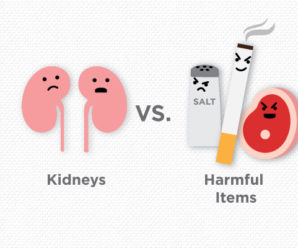
When the runny nose and sneezing disappear after a cold but the cough sticks around, it’s probably bronchitis.
Nobody has time for bronchitis. That pesky cough can mean missed work and school days.
Here’s what you should know about bronchitis to feel better faster.
1. There are two types of bronchitis.
Bronchitis occurs when the main airways that lead to the lungs are inflamed, said Dr. Shalini Ravi, a Marshfield clinic internal medicine/pediatrics physician.
Acute bronchitis usually follows a viral upper respiratory tract infection like the common cold or flu. Symptoms last five days to three weeks. Young children and older adults are at greater risk for illness
Chronic bronchitis lasts at least three months a year for two years in a row. It’s usually seen in patients with emphysema and chronic obstructive pulmonary disease (COPD).
2. Coughing is the main symptom.
A wet or dry cough is characteristic of acute bronchitis. Many patients have chest wall pain from coughing. Some patients become short of breath, wheeze or develop a low-grade fever between 98.6 and 101 degrees Fahrenheit.
3. After five days, see a doctor.
“If a patient has been coughing for more than five days and is uncomfortable with chest pain or shortness of breath, it’s a good idea to get help,” Ravi said.
Your doctor can diagnose bronchitis from your description of symptoms and by doing a physical exam.
Seek medical treatment sooner if you have a fever, cough to the point of vomiting or feel too out of breath to go to work or school. Your doctor may want to test for pneumonia and whooping cough.
4. Antibiotics probably aren’t necessary.
“Antibiotics usually don’t shorten the length of symptoms because most bronchitis is viral,” Ravi said.
Your doctor will likely recommend over-the-counter (OTC) medications to treat symptoms or prescribe stronger cough medicine if needed.
Bacteria occasionally cause bronchitis. If that happens, your doctor may prescribe antibiotics.
5. OTC drugs and honey can treat symptoms.
Use acetaminophen or ibuprofen to treat body pain and low-grade fever. Take Sudafed during the day and a 25-milligram Benadryl tablet at night to shorten the duration of coughing symptoms, Ravi said. Talk to a pediatrician about dosing for your child’s age and size.
For natural symptom relief, try one-half a teaspoon of honey for children older than two years and up to two teaspoons of honey for older children and adults. Honey was shown to be better at reducing nighttime coughing than OTC cough medicines in some clinical trials.
Drink water, use a humidifier at night and avoid smoking or secondhand smoke to reduce symptoms.







Leave a Reply